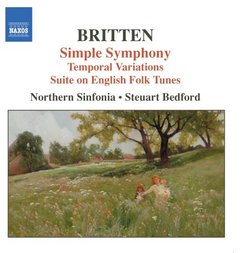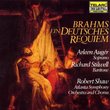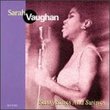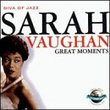| All Artists: Benjamin Britten, Steuart Bedford, Robert Burns, Thomas Randolph, John Philip, Robert Greene, Catherine Wyn-Rogers, Northern Sinfonia Chorus Title: Britten: Simple Symphony; Temporal Variations; Suite on English Folk Tunes Members Wishing: 0 Total Copies: 0 Label: Naxos Release Date: 1/18/2005 Genres: Pop, Classical Styles: Vocal Pop, Chamber Music, Forms & Genres, Concertos, Sonatas, Historical Periods, Modern, 20th, & 21st Century, Instruments, Reeds & Winds, Strings, Symphonies Number of Discs: 1 SwapaCD Credits: 1 UPCs: 747313220526, 074731322052 |
Search - Benjamin Britten, Steuart Bedford, Robert Burns :: Britten: Simple Symphony; Temporal Variations; Suite on English Folk Tunes
 | Benjamin Britten, Steuart Bedford, Robert Burns Britten: Simple Symphony; Temporal Variations; Suite on English Folk Tunes Genres: Pop, Classical |
Larger Image |
CD DetailsSimilarly Requested CDs
|
CD ReviewsAn Important Britten Collection J Scott Morrison | Middlebury VT, USA | 03/23/2005 (5 out of 5 stars) "Another in the reissues from Naxos from the valuable Britten series on the now-defunct Collins Classics, this program was originally published in 1998. Steuart Bedford is undoubtedly the leading Britten conductor and this is left in no doubt in this delightful collection of Britten works that span forty years of his composing life, from the 1934 'Simple Symphony' to the gorgeous set of variations for viola and orchestra, 'Lachrymae,' from 1976. All are played with clarity and élan. The 'Simple Symphony' for strings is probably the most familiar piece here. It was put together by Britten from pieces he had written in childhood and the movements have witty titles: Boisterous Bourrée, Playful Pizzicato, Sentimental Sarabande, and Frolicsome Finale. Bedford sorts it forth in appropriately simple fashion, letting the music speak for itself. The Northern Sinfonia strings play beautifully for him. 'Temporal Variations' from 1936 was originally for oboe and piano but the present oboe soloist, Nicholas Daniel, suggested to composer Colin Matthews about ten years ago that he arrange it for oboe and strings and that is the version heard here. It was premièred at the Aldeburgh Festival with Bedford leading the English Chamber Orchestra. It is a neoclassic theme and eight variations in the form of character pieces with titles such as 'March,' 'Oration,' 'Commination' (an archaic term meaning 'denunciation'), 'Resolution.' Daniel is fine advocate for this fourteen-minute miniature oboe concerto. 'A Charm of Lullabies' Op. 41 (1947) is also fairly well-known and has been recorded many times, but usually with the original piano accompaniment. Here we again have an arrangement by Colin Matthews, this time for chamber orchestra, done for the Indianapolis Symphony. It is sung here with simple intensity and wonderful diction by mezzo Catherine Wyn-Rogers. 'Suite on English Folk Tunes' Op. 90 (1974) subtitled 'A time there was ...' was Britten's last purely orchestral work. It combines some seventeenth-century folksongs from Playford's 'The Dancing Master' with songs collected in the twentieth-century from rural sources. This is vintage late Britten with rhythmic complexity, brilliant orchestration and open-faced tunefulness. One hears echoes of the 'Sea Interludes' and 'Prince of the Pagodas' in the creative orchestration. For me the most riveting of the works recorded here is Britten's masterful 'Lachrymae' Op. 48a (1976) for solo viola and string orchestra. Originally written for viola and piano for William Primrose in 1950, Britten recast it for viola and strings in 1976 for a performance by Cecil Aronowitz and the ECO at Aldeburgh. It is a theme and variations based on two tunes of Dowland: primarily 'If my complaints could passions be' and, in the sixth variation, 'Flow my tears.' Of course the title 'Lachrymae' is taken from the latter song and generally reflects the overall tone of the piece, although Variation 8 is a lively march. It makes brilliant use of the melancholy timbre of the viola and is played movingly here by Philip Dukes. This is the astringent Britten familiar to us from such works as 'Phaedra' and 'Death in Venice.' For all its restriction of means, it is a brilliant and moving work. We can only be grateful that Naxos has kept these wonderful performances of Britten's music alive by reissuing the Collins/Bedford series. Highly recommended. TT=71:46 Scott Morrison" A Great Britten Collection D. A Wend | Buffalo Grove, IL USA | 08/12/2008 (5 out of 5 stars) "This collection of Benjamin Britten's music spans his career. The earliest work is the Simple Symphony from 1934 which was composed using juvenilia. Britten preserved his compositions from his earliest years and wove these efforts into the charming Simple Symphony for strings or string quartet. The movement titles: Boisterous Bourree, Playful Pizzicato, Sentimental Sarabande and Frolicsome Finale indicate the childhood origins of the melodies but the symphony shows the maturity of the composer who, at 21, was a master. In particular, the Sarabande exhibits a wonderful depth of feeling while the Bourree, Pizzicato and Finale are delightfully inventive. The Temporal Variations is another early work (1936) that was performed but not published by the composer. The original work was for oboe and piano but was orchestrated by Colin Matthews for oboe and orchestra and performed in 1994. The Variations, consisting of 9 short movements, is a striking work for oboe and the string orchestra makes this an interesting pairing. A Charm of Lullabies was written in 1947 for Nancy Evans and was scored for voice and piano: the music was orchestrated by Colin Matthews in 1990. The suite is in 5 movements: A Cradle Song, The Highland Balou, Sephestia's lullaby, A Charm and The Nurse's Song. The Lachrymae was written in 1950 for viola and piano and was revised by Benjamin Britten first in 1970 and in 1976 for viola and string orchestra. The inspiration comes from a song of John Dowland (If my complaints could passions move) and is composed as a theme with 10 variations. The music is introspective and reflective, indicative of the title. The final work, Suite on English Folk Tunes, "A time there was..." was composed during 1974 utilizing an older folk song arrangement of Hankin Booby as the third movement of the suite. The suite was dedicated to the memory of Australian composer Percy Grainger. In fact, Britten quotes the melody Lord Melbourne, the final movement of the suite, from Grainger's transcription. The music is colorful and beautifully orchestrated. The dance-like music of the first four movements is contrasted with the poignant Lord Melbourne, which is quiet with a sad English horn solo; the music fading away. The CD has, for me, music of Benjamin Britten that I do not have. I was looking for a good performance of the Simple Symphony and I am happy I selected this recording. The music is nicely recorded and beautifully conducted by Britten expert Steuart Bedford. " Really Interesting R. Albin | Ann Arbor, Michigan United States | 01/13/2008 (4 out of 5 stars) "This is a very rewarding collection of infrequently performed Britten works. The level of performances by the Northern Sinfonia and soloists are excellent. This collection spans Britten's remarkable career, including both the Opus 4 Simple Symphony and the Suite on English Folk Tunes, Britten's last orchestral work. These pieces show the remarkable progression of Britten's work across the length of his career. All pieces, including the Simple Symphony, display Britten's remarkable melodic gifts. The later works in this set reveal the maturation of Britten's skill at orchestration and his ability to exploit the qualities of individual instruments."
|










